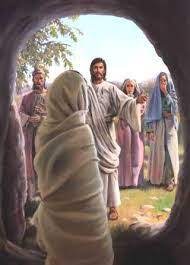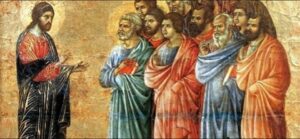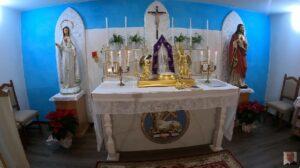
He cried out with a loud voice, Lazarus, come forth!
ORARI S.MESSA DI OGGI VENERDI 1 APRILE 2022, ORE 8.00 – Feria Sexta infra Hebdomadam IV in Quadragesima ~ III. classis
S.MESSA ONLINE DI DON ENRICO RONCAGLIA, su youtube channel:
https://www.youtube.com/channel/UCYYDj4O4e11cE7XNtngkoJA E QUI:
LITURGIA IN LATINO\ENGLISH:
https://divinumofficium.com/cgi-bin/missa/missa.pl
COMMUNIO PREGHIERE\PRAYERS:
https://www.proselitismodellascienza.it/2021/10/25/communio-e-comunione-spirituale/
EVANGELIUM E OMELIA\HOMILY:
Evangelium Ioann 11:1-45
In illo témpore: Erat quidam languens Lázarus a Bethánia, de castéllo Maríæ et Marthæ, soróris eius. (María autem erat, quæ unxit Dóminum unguento, et extérsit pedes eius capíllis suis: cuius frater Lázarus infirmabátur.) Misérunt ergo soróres eius ad eum, dicéntes: Dómine, ecce, quem amas infirmátur. Audiens autem Iesus, dixit eis: Infírmitas hæc non est ad mortem, sed pro glória Dei, ut glorificétur Fílius Dei per eam. Diligébat autem Iesus Martham et sorórem eius, Maríam, et Lázarum. Ut ergo audívit, quia infirmabátur, tunc quidem mansit in eódem loco duóbus diébus. Déinde post hæc dixit discípulis suis: Eámus in Iudæam íterum. Dicunt ei discípuli: Rabbi, nunc quærébant te Iudæi lapidáre, et íterum vadis illuc? Respóndit Iesus: Nonne duódecim sunt horæ diéi? Si quis ambuláverit in die, non offéndit, quia lucem huius mundi videt: si autem ambuláverit in nocte, offéndit, quia lux non est in eo. Hæc ait, et post hæc dixit eis: Lázarus, amícus noster, dormit: sed vado, ut a somno éxcitem eum. Dixérunt ergo discípuli eius: Dómine, si dormit, salvus erit. Díxerat autem Iesus de morte eius: illi autem putavérunt, quia de dormitióne somni díceret. Tunc ergo Iesus dixit eis maniféste: Lazarus mórtuus est: et gáudeo propter vos, ut credátis, quóniam non eram ibi: sed eámus ad eum. Dixit ergo Thomas, qui dícitur Dídymus, ad condiscípulos: Eámus et nos, ut moriámur cum eo. Venit itaque Iesus, et invénit eum quátuor dies iam in monuménto habéntem. (Erat autem Bethánia iuxta Ierosólymam quasi stádiis quíndecim.) Multi autem ex Iudæis vénerant ad Martham et Maríam, ut consolaréntur eas de fratre suo. Martha ergo, ut audívit quia Iesus venit, occúrrit illi: María autem domi sedébat. Dixit ergo Martha ad Iesum: Dómine, si fuísses hic, frater meus non fuísset mórtuus: sed et nunc scio, quia, quæcúmque popósceris a Deo, dabit tibi Deus. Dicit illi Iesus: Resúrget frater tuus. Dicit ei Martha: Scio, quia resúrget in resurrectióne in novíssimo die. Dixit ei Iesus: Ego sum resurréctio et vita: qui credit in me, étiam si mórtuus fúerit, vivet: et omnis, qui vivit et credit in me, non moriétur in ætérnum. Credis hoc? Ait illi: Utique, Dómine, ego crédidi, quia tu es Christus, Fílius Dei vivi, qui in hunc mundum venísti. Et cum hæc dixísset, ábiit et vocávit Maríam, sorórem suam, siléntio, dicens: Magíster adest, et vocat te. Illa ut audívit, surgit cito, et venit ad eum: nondum enim vénerat Iesus in castéllum; sed erat adhuc in illo loco, ubi occúrrerat ei Martha. Iudæi ergo, qui erant cum ea in domo et consolabántur eam, cum vidíssent Maríam, quia cito surréxit et éxiit, secúti sunt eam, dicéntes: Quia vadit ad monuméntum, ut ploret ibi. María ergo, cum venísset, ubi erat Iesus, videns eum, cécidit ad pedes eius, et dicit ei: Dómine, si fuísses hic, non esset mórtuus frater meus. Iesus ergo, ut vidit eam plorántem, et Iudæos, qui vénerant cum ea, plorántes, infrémuit spíritu, et turbávit seípsum, et dixit: Ubi posuístis eum? Dicunt ei: Dómine, veni et vide. Et lacrimátus est Iesus. Dixérunt ergo Iudæi: Ecce, quómodo amábat eum. Quidam autem ex ipsis dixérunt: Non póterat hic, qui apéruit óculos cæci nati, facere, ut hic non morerétur? Iesus ergo rursum fremens in semetípso, venit, ad monuméntum. Erat autem spelúnca, et lapis superpósitus erat ei. Ait Iesus: Tóllite lápidem. Dicit ei Martha, soror eius, qui mórtuus fuerat: Dómine, iam fetet, quatriduánus est enim. Dicit ei Iesus: Nonne dixi tibi, quóniam, si credíderis, vidébis glóriam Dei? Tulérunt ergo lápidem: Iesus autem, elevátis sursum óculis, dixit: Pater, grátias ago tibi, quóniam audísti me. Ego autem sciébam, quia semper me audis, sed propter pópulum, qui circúmstat, dixi: ut credant, quia tu me misísti. Hæc cum dixísset, voce magna clamávit: Lázare, veni foras. Et statim pródiit, qui fúerat mórtuus, ligátus pedes et manus ínstitis, et fácies illíus sudário erat ligáta. Dixit eis Iesus: Sólvite eum, et sínite abíre. Multi ergo ex Iudæis, qui vénerant ad Maríam et Martham, et víderant quæ fecit Iesus, credidérunt in eum.
Gospel
John 11:1-45
At that time, a certain man was sick, Lazarus of Bethany, the village of Mary and her sister Martha. Now it was Mary who anointed the Lord with ointment, and wiped His feet dry with her hair, whose brother Lazarus was sick. The sisters therefore sent to Him, saying, Lord, behold, he whom You love is sick. But when Jesus heard this, He said to them, This sickness is not unto death, but for the glory of God, that through it the Son of God may be glorified. Now Jesus loved Martha and her sister Mary, and Lazarus. So when He heard that he was sick, He remained two more days in the same place. Then afterwards He said to His disciples, Let us go again into Judea. The disciples said to Him, Rabbi, just now the Jews were seeking to stone You; and do You go there again? Jesus answered, Are there not twelve hours in the day? If a man walks in the day, he does not stumble, because he sees the light of this world. But if he walks in the night, he stumbles, because the light is not in him. These things He spoke, and after this He said to them, Lazarus, our friend, sleeps. But I go that I may wake him from sleep. His disciples therefore said, Lord, if he sleeps, he will be safe. Now Jesus had spoken of his death, but they thought He was speaking of the repose of sleep. So then Jesus said to them plainly, Lazarus is dead; and I rejoice on your account that I was not there, that you may believe. But let us go to him. Thomas, who is called the Twin, said therefore to his fellow-disciples, Let us also go, that we may die with Him. Jesus therefore came and found him already four days in the tomb. Now Bethany was close to Jerusalem, some fifteen stadia distant. And many of the Jews had come to Martha and Mary, to comfort them on account of their brother. When, therefore, Martha heard that Jesus was coming, she went to meet Him. But Mary remained at home. Martha therefore said to Jesus, Lord, if You had been here my brother would not have died. But even now I know that whatever You shall ask of God, God will give it to You. Jesus said to her, Your brother shall rise. Martha said to Him, I know that he will rise at the resurrection, on the last day. Jesus said to her, I am the resurrection and the life; he who believes in Me, even if he die, shall live; and whoever lives and believes in Me, shall never die. Do you believe this? She said to Him, ‘Yes, Lord, I believe that You are the Christ, the Son of God, Who have come into the world. And when she had said this, she went away and quietly called Mary her sister, saying, The Master is here and calls you. As soon as she heard this, she rose quickly and came to Him, for Jesus had not yet come into the village, but was still at the place where Martha had met Him. When, therefore, the Jews who were with her in the house and were comforting her, saw Mary rise up quickly and go out, they followed her, saying, She is going to the tomb to weep there. When, therefore, Mary came where Jesus was, and saw Him, she fell at His feet, and said to him, Lord, if You had been her, my brother would not have died. When, therefore, Jesus saw her weeping, and the Jews who had come with her weeping, He groaned in spirit and was troubled, and said, Where have you laid him? They said to Him, Lord, come and see. And Jesus wept. The Jews therefore said, See how He loved him. But some of them said, Could not He Who opened the eyes of the blind, have caused that this man should not die? Jesus therefore, again groaning in Himself, came to the tomb. Now it was a cave and a stone was laid against it. Jesus said, Take away the stone. Martha, the sister of him who was dead, said to Him, Lord, by this time he is already decayed, for he is dead four days. Jesus said to her, Have I not told you that if you believe you shall behold the glory of God? They therefore removed the stone. And Jesus, raising His eyes, said, Father, I give You thanks that You have heard Me. Yet I knew that You always hear Me; but because of the people who stand round, I spoke, that they may believe that You have sent Me. When He had said this, He cried out with a loud voice, Lazarus, come forth! And at once he who had been dead came forth, bound feet and hands with bandages, and his face was tied up with a cloth. Jesus said to them, Unbind him, and let him go. Many therefore of the Jews who had come to Mary, and had seen what He did, believed in Him.
.
.
DALL’OMELIA DI (FROM THE HOMILY BY) DON ENRICO RONCAGLIA – ORARI S.MESSA DI OGGI VENERDI 1 APRILE 2022, ORE 8.00

DALL’OMELIA DI DON ENRICO RONCAGLIA (*)
3 Reg 17:17-24
In quei giorni avvenne che il figlio di quella donna si ammalò d’una malattia gravissima che lo fece restare senza respiro. Essa allora disse ad Elia: «Che passa fra me e te, o uomo di Dio? Sei venuto da me per rinnovare la memoria delle mie iniquità e per far morire il mio figlio?». Elia le disse: «Dammi il tuo figlio».
Joann 11:1-45
In quel tempo, era ammalato un certo Lazzaro di Betania, il villaggio di Maria e Marta sua sorella. Maria era quella che unse d’unguento il Signore e gli asciugò i piedi coi suoi capelli; l’infermo era Lazzaro suo fratello. Le sorelle mandarono dunque a dirgli: «Signore, ecco, colui che tu ami, è ammalato?». Ciò udito, Gesù rispose: «Questa non è infermità da morirne, ma è per la gloria di Dio, affinché per essa il Figlio di Dio sia glorificato».
La liturgia parla di diverse resurrezioni. La prima operata dal profeta Elia, attraverso tre interventi sul giovinetto morto che resuscita.
Per Gesu’ basta invece il suo desiderio: basta che dica “Lazzaro vieni fuori!”.
Il miracolo della resurrezione di Lazzaro e’ impensabile: era morto da ben quattro giorni!
Si tratta di un grande prodigio della fede! Il Signore ci invita a credere: nella fede troviamo il segreto della potenza di Dio.
Il fetore del morto e’ figura del fetore del peccato delle nostre anime.
Preghiamo dunque per la conversione dei peccatori e di noi stessi!
Sia lodato Gesu’ Cristo! Sempre sia lodato!.
__________________
(*) Questo commento e’ scritto in tempo reale durante l’omelia. Mi scuso per l’eventuale misinterpretazione delle parole di Don Enrico.
FROM THE HOMILY BY DON ENRICO RONCAGLIA (**)
t3 Reg 17: 17-24 In those days it happened that that woman’s son fell ill with a very serious disease that made him breathless. She then said to Elijah: “What is going on between you and me, O man of God?” Did you come to me to renew the memory of my iniquities and to make my son die? ». Elijah said to her, “Give me your son.”
Joann 11: 1-45 At that time, a certain Lazarus of Bethany, the village of Mary and his sister Martha, was ill. Mary was the one who anointed the Lord with ointment and wiped his feet with her hair; the invalid was his brother Lazarus. The sisters therefore sent word to him, “Lord, behold, is the one you love sick?” Hearing this, Jesus replied: “This is not infirmity to die of, but it is for the glory of God, so that through it the Son of God may be glorified.”
The liturgy speaks of various resurrections. The first performed by the prophet Elijah, through three interventions on the dead man who resurrects.
For Jesus, on the other hand, his desire is enough: he just needs to say “Lazarus, come out!”.
The miracle of the resurrection of Lazarus is unthinkable: he had been dead for four days! It is a great prodigy of faith!
The Lord invites us to believe: in faith we find the secret of God’s power.
The stench of the dead is a figure of the stench of sin in our souls.
Let us therefore pray for the conversion of sinners and of ourselves!
Praised be Jesus Christ. Always be praised!
__________________
(*) This comment is written in real time during the homily. I apologize for any misinterpretation of Don Enrico’s words.

